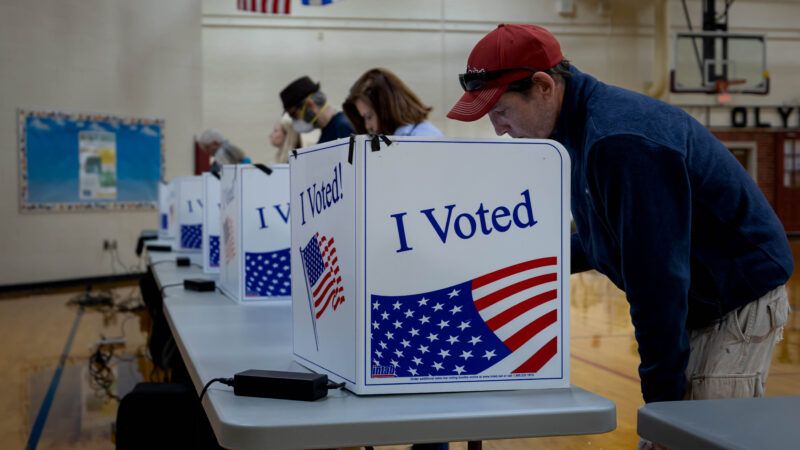'No One' Wins 11 Delegates in Democratic Primaries on Super Tuesday
The "uncommitted" protest campaign had a strong showing in Minnesota, but underperformed in other states.

The campaign to get Democrats to vote "uncommitted" as a protest against President Joe Biden's foreign policy shattered expectations in the Minnesota primary, but had mixed results in other state primaries on Super Tuesday.
The Listen to Minnesota campaign, which is calling for a ceasefire in Gaza, had set a modest expectation of 5,000 uncommitted votes in a statement sent out Tuesday afternoon, after voting had begun but before any results were reported.
By Wednesday morning, over 45,900 uncommitted votes had been counted—19 percent of the total—resulting in 11 uncommitted delegates to the Democratic National Convention.
Elsewhere, the campaign kept its cards close to the chest. When asked on Tuesday at noon about their expected numbers nationwide, organizer Shabd Singh told Reason that they are "holding on to that information for the moment."
The uncommitted campaign in Iowa modestly outperformed its results from 2012, when the Occupy movement in the state mounted a similar challenge to then-President Barack Obama. Uncommitted votes were 4 percent this time, as opposed to 1 percent in 2012.
Around 9 percent of Democrats voted "no preference" in Massachusetts this time, slightly lower than the result in 2012. Around 12 percent voted uncommitted in North Carolina, a state where 20 percent of Democrats had voted uncommitted in 2012.
Last week, Biden campaign co-chair Mitch Landrieu told NPR that the "message has been received" but that he was confident that uncommitted voters would not choose Donald Trump, "who is going to be much, much worse than the difficult circumstances that we have right now."
The uncommitted campaign began in Michigan as a way for Arab Americans and other supporters of Palestinian rights to show that Biden's support for Israel and attacks on Yemen could cost him a swing state. Listen to Michigan, a pressure group organized a month before the primary, boasted a quarter-million-dollar budget and the endorsement of Democratic Rep. Rashida Tlaib.
Armenian Americans in Michigan also lent their support to the campaign at the last minute, in order to protest U.S. military aid for Armenia's enemy Azerbaijan.
After the Michigan primary ended with 100,000 votes uncommitted and two uncommitted delegates, organizers in other states sprung into action. The New York Times described a ragtag, sometimes chaotic rush to seize the momentum that had started in Michigan.
The Listen to Minnesota campaign, for example, was founded a day after the Michigan primary. It spent a total of $20,000 on advertising and other campaign expenses, according to organizers. Yet Democratic Rep. Ilhan Omar, a vocal supporter of the Palestinian cause, did not endorse the campaign.
Despite the last-minute nature of the campaigns, there is no sign of factions attempting to claim uncommitted votes for other causes. The uncommitted campaigns (apart from the Armenian-American one) have focused their messaging on the U.S. role in the Israeli-Palestinian conflict.
Biden "and his administration shifted their rhetoric, but the policy of opposition to a lasting ceasefire and support of weapons aid [to Israel] have remained the same," Listen to Minnesota said in its Tuesday afternoon statement. "We know the power of our vote and we are planning on using that right to let the President know that his disregard of Palestinian lives will cost him dearly."
The Biden administration began to call for a ceasefire in Gaza—albeit a temporary, conditional one—late last month. It was a major shift from October 2023, when State Department officials were banned from using even the phrases "de-escalation" and "end to violence/bloodshed."
Of course, it's hard to tell how much this shift is a result of Democratic voters, as opposed to the looming starvation inside Gaza and the desire to avoid bloodshed during the Muslim holiday of Ramadan, a possibility Biden called "very dangerous."
Other Democratic challengers to Biden include spiritualist writer Marianne Williamson, a left-wing dove, and former Minnesota Rep. Dean Phillips, whose foreign policy is around as hawkish as that of Biden. Williamson had earlier suspended her campaign, then "unsuspended" it after the Michigan primary.
They both lost to "uncommitted" in every state where that was on the ballot. When it comes to Democratic alternatives, it seems that "no one" is more popular than anyone.
"Congratulations to Joe Biden, Uncommitted, Marianne Williamson, and Nikki Haley for demonstrating more appeal to Democratic Party loyalists than me," Phillips wrote in a social media statement on Tuesday night.


Show Comments (13)